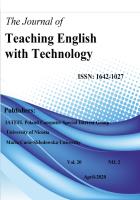A STUDY INTO THE IMPACT OF THE CHOICE
OF COGNITIVE AND META-COGNITIVE STRATEGIES AND PODCASTS ON VOCABULARY GAIN AND RETENTION LEVELS IN THE TELEGRAM-BASED E-LEARNING CONTEXT
A STUDY INTO THE IMPACT OF THE CHOICE
OF COGNITIVE AND META-COGNITIVE STRATEGIES AND PODCASTS ON VOCABULARY GAIN AND RETENTION LEVELS IN THE TELEGRAM-BASED E-LEARNING CONTEXT
Author(s): Atefeh Elekaei, Hossein Heidari Tabrizi, Azizeh ChalakSubject(s): Foreign languages learning
Published by: IATEFL Poland Computer Special Interest Group and The University of Nicosia
Keywords: e-learning; cognitive strategy; meta-cognitive strategy; vocabulary gain; podcasts; vocabulary retention
Summary/Abstract: Forming synchronous and asynchronous learning networks utilizing internet has been simplified by new technologies. The present study investigated the effects of learners’ choice of cognitive and meta-cognitive strategies on vocabulary gain and retention levels in the e-learning context. 180 participants took part in this study and 120 audio podcasts plus still and animated pictures were presented to the participants in the Telegram channel. 23 strategy items on a 5-point Likert scale were presented to the participants by means of a voting robot system on the main page of the channel after the treatment. Additionally, an immediate as well as a delayed vocabulary posttest in the form of multiple-choice were administered, separately. Four one-way ANOVAs were run in order to answer the questions. The results revealed that the choice of cognitive strategy significantly affected the level of vocabulary gain and retention. In other words, learners who applied more cognitive strategies had higher levels in vocabulary gain and retention. However, the choice of meta-cognitive strategy had no considerable influence on vocabulary gain and retention.
Journal: Teaching English with Technology
- Issue Year: 20/2020
- Issue No: 2
- Page Range: 98-117
- Page Count: 20
- Language: English

